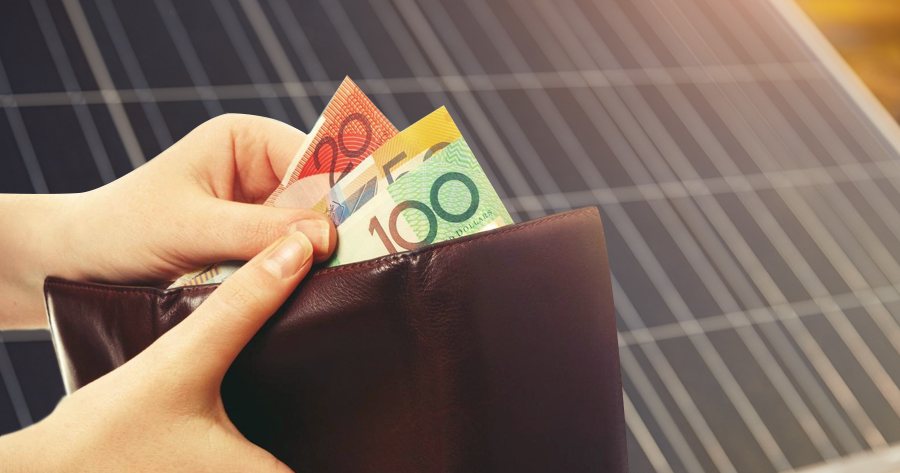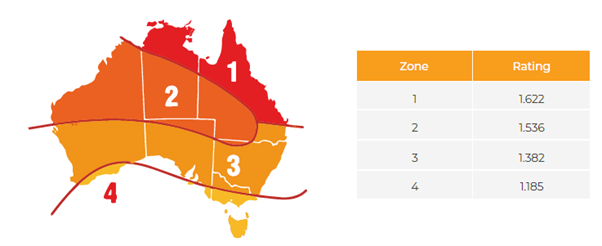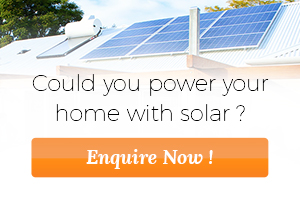How Much Do Solar Panels Cost?

One of the main questions we receive from people enquiring about installing a solar power system, is of course around how much they can expect to pay.
This is a difficult question to answer generally, as solar power system cost can depend heavily on your power requirements, your lifestyle, energy usage habits, and even your home layout.
In this blog we will talk about some of the things that can affect your solar system price and give you a general idea of how much you should budget for your new solar PV system.
The solar panel price trend
The price of installing a solar power system has dropped significantly over the last decade, in large part thanks to a solid reduction in solar panel costs.
The increased affordability of solar panels has seen Australia achieve the highest rate of household solar panel installations in the world, with around 29% of homes with rooftop solar PV. As of 31 March 2021, about 2.77 million small-scale solar power systems have been installed across Australia. Of course, solar panels are not the only component you need to consider when budgeting for your new solar power system.
How much should a solar power system cost?
Solar panels can vary greatly in price due to the quality of the solar panels and the reputation of the solar panel manufacturer. However, solar panels only make up a partial amount of the total cost of your solar PV system.
There are a number of other components that are used in a solar power system. Just as the quality of solar panels can dictate the price, the same goes for the other components included in your solar energy system.
Infinite Energy stocks solar panels from Canadian Solar and SunPower. We have chosen these brands as they are reputable manufacturers, dedicated to producing solar panels of the highest quality and efficiency.
We always encourage our customers to shop around, and ensure they don't purchase the cheapest solar PV system on the market to best protect their investment.
The additional components that make up your solar power system (and its cost) include:
- Mounting System
The mounting system physically connects the solar panels to your roof. A crucial component of a solar array, your mounting system will be subjected to major environmental stresses such as hail and wind throughout the life of the solar power system. As such, it’s vital to invest in a high quality, corrosion resistant mounting system to ensure the durability of your solar PV system.
- Balance of System
Often referred to as the Balance of System (BOS), the total cost of installing a solar PV system also includes electrical components like wires, cables, isolators, breakers, switches, and of course a solar inverter.
Lying at the heart of your solar PV system, the solar inverter converts the DC electricity your solar panels generate, into AC electricity the appliances in your home use. Due to playing such an important role within the system, solar inverters often contribute to up to 50% of the total cost.
- Installation
It’s a condition of most solar panel warranties that your panels are installed by a qualified electrician, additionally, you’re only eligible to receive STCs if your panels are installed by a CEC approved electrician. Ensuring that you are paying for an experienced electrician to install your solar power system makes sure your system performs safely for years to come.
Why does price vary between solar power systems?
If you are getting multiple quotes from different solar power companies, chances are you are also getting a very wide range of quotes. So why do prices differ so much for what seems to be similar solar power systems?
Generally speaking, variations in price are usually down to the quality of the solar panels and solar inverter offered by the solar power company. While it may be tempting to go with the cheapest quote you receive, make sure that you know what brands and products you will be receiving as part of your solar PV system. Cheap solar power systems will likely consist of low-quality components which will ultimately end up costing you more to repair or replace in the long run.
In Australia, the price of a good quality system* can range from the following:
|
Solar system size |
Average out-of-pocket cost of solar system |
Average number of panels |
Average payback period |
|
$3,000 – $5,000 |
8 |
3 years |
|
|
$3,500 – $7,000 |
11 |
3-4 years |
|
|
$4,000 – $8,000 |
14 |
2.5-4 years |
|
|
$4,000 – $9,000 |
17 |
3-6 years |
|
|
$7,000 – $11,000 |
19 |
3-6 years |
|
|
$7,500 – $11,500 |
22 |
3-6 years |
|
|
$9,500 – $14,000 |
25 |
3-6 years |
|
|
$9,500 – $14,500 |
27 |
3-6 years |
If you receive a quote from any company that’s less than the minimum prices above, we recommend doing your own research into the brands, quality and warranties of the products making up that solar PV system, checking that the price includes all the required components, and looking at the reputation of the company installing that system to ensure these things meet your expectations.
What is the solar power government rebate?
The Renewable Energy Target is a Federal Government policy designed to encourage the additional generation of renewable energy to reduce greenhouse gas emissions in the electricity sector.
The Small-scale Renewable Energy Scheme (SRES) is one part of the Renewable Energy Target, creating STCs, which are applicable to small-scale renewable energy generation installations under 100kW. You can learn more about the Renewable Energy Target and its applicable schemes here.
STCs are a financial government incentive and system owners receive 1 STC for every MWh (megawatt hour) of electricity their solar power system will generate until January 2031.
STCs act as a form of currency that can be sold to recover a portion of the cost of purchasing the solar power system. Because STCs are traded and bought on the open market they can fluctuate in value, although they currently trade for around $38 each.
It’s common practice to allocate the STCs to the system provider in exchange for an up-front discount on the purchase price. Infinite Energy offers this service to help streamline the process for our customers.
In addition to the rebate offered through the Renewable Energy Target scheme, each state government has their own rebate and incentive offers for installing solar power, click here to learn what is applicable for your state.
Why do solar panel prices differ from state to state?
So, in addition to any applicable solar power rebates or incentives that your home state may offer, your final solar power price will depend on the number of STCs you receive.
This varies depending on where in Australia you live, as different parts of the country generate vastly differing amounts of renewable energy. For example, as there is more sunshine, Darwin will be able to generate more solar power than Hobart and is consequently eligible to receive a larger rebate.

To calculate how many STCs you would receive for your system you can use the following formula:
Postcode Zone Rating x Years Until 2031 x System Size in kW = Number of STCs created
For example, let’s say you live in Perth which is in Zone 3 and has a rating of 1.382 . You decide to invest in a 5.5kW system and are planning to install in 2021.
So, this calculation would be: 1.382 x 10 x 5.5 = 76 STCs
With the current STCs price at around $38 per STC, you can work out your STC rebate amount: 76 STCs x $38 = a STC rebate value of $2,888. You can also use this STC calculator provided by the REC registry.
These varying STC amounts are why identical solar power systems costs can vary between certain areas of Australia.
Choose to invest in solar with the best
After more than a decade in business and over 18,000 installations to our name, Infinite Energy has the experience and expertise to ensure they can match you with the perfect solar power system for your unique needs.
Get in touch with us by requesting a no obligation call back, or giving us a call on 1300 074 669 to speak with one of our energy consultants.


